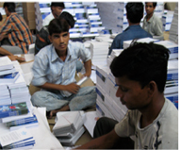Kenya (MNN) — Rising food prices
are adding to the problem of growing hunger as the Horn of Africa grapples with
its worst drought in more than half a century.
According to the United Nations, the famine has yet to peak, but hundreds of thousands of people are likely to
die without a massive global response.
More aid is getting through in critical areas, but there are many related problems. According to Bright Hope International, children are dropping out of school, and high
inflation is making it extremely difficult for poor families to buy food,
especially in Kenya.
Craig
Dyer with
Bright Hope International says responding wasn't the question. It was how best to help the sheer
number of refugees on the move. "Somali
refugees are placed in government and internationally-run camps. You can't work
in those when you're an agency like Bright Hope. We're not given access, and so
we have to look for other opportunities–surrounding areas, people in
Kenya."
As a result, their response has to be carefully crafted, Dyer
explains. "We've been a little handicapped in Kenya and overwhelmed,
so we are in the beginning stages of it."
Rather than "reinvent the wheel,"
Dyer says they will do what they do best. "There are other agencies that
are bigger than us, that have come in with immediate needs. So we immediately
go to the next level and say, 'What can we do for longer-term needs? Water needs,
agricultural issues, even jobs training and especially evangelism and church
training."
750,000 refugees have already left
their homes, and 9,000 more are streaming into Kenya every week from
Somalia. There are many cases of severe malnutrition, and Kenya alone says
it has 2.4 million people at stressed and crisis levels. Dyer says, "The heart of it is: what is
the church able to do to not only relieve the suffering of those from the
famine, but also use it for the eternal purposes of our Lord and Savior, Jesus
Christ?"
In Kenya, they help a ministry to
Somalian refugees as well as serve thousands of the poorest people in the
country. They're asking, "Where is
there opportunity to say, 'This is a place where we can share the Gospel?'"
Dyer says if the Ethiopia famine taught
them anything, it was that meeting physical and spiritual needs change the
landscape of the country. After the
Christians responded to the famine over a quarter century ago, he says that many
Gospel seeds were planted, resulting in evangelistic growth that grew to include
20% of the population.
The conditions are ripe for the Horn
of Africa. Says Dyer, "The same thing could happen now in Somalia, where there's been
such persecution of the church, now such a crisis in the country, sending
people fleeing. It's our opportunity to minister to them in the name of the Lord,
share the love of Christ, and hopefully have them go back to their homes and see
the spread of the Gospel."
Bright Hope continues to plan out
its second wave response. In the meantime, Dyer asks believers to pray that God
would use the tragedy to strengthen His church.
For the ministry, "Pray that the resources would come in and that the
people on the ground in Kenya would be protected and find real strategic efforts
that will build the kingdom of God."

